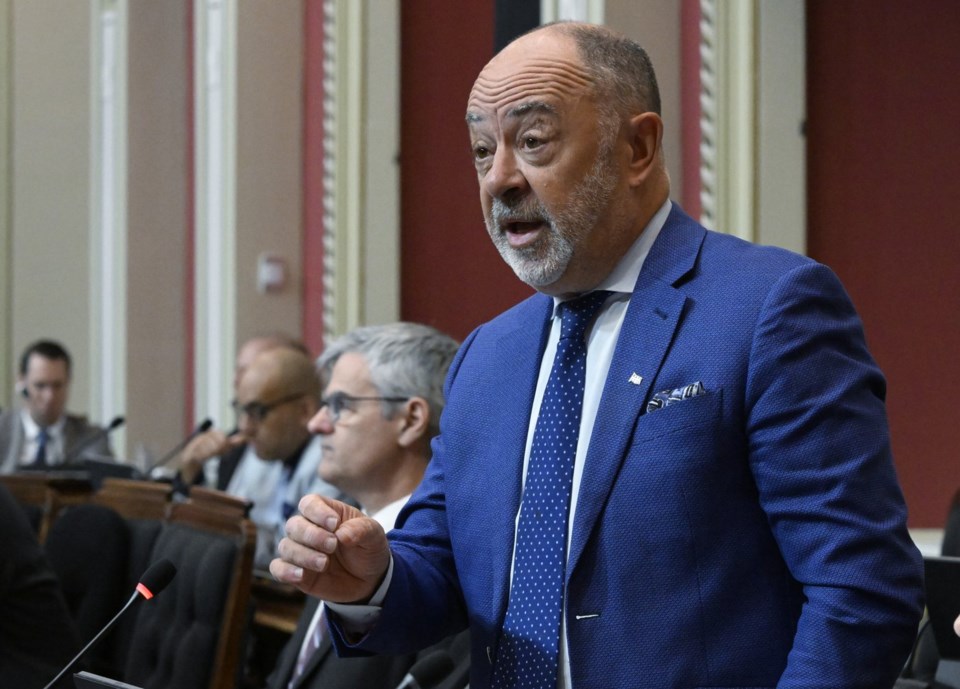MONTREAL — Quebec's Health Department says it will be ready to meet the expected demand for advanced applications for medical assistance in dying when it begins accepting those requests next week.
Dr. Stéphane Bergeron, an associate deputy minister in the department, told reporters in a briefing on Thursday that it will take time for the first requests to be approved, which will give the health system further room to prepare.
"It's not something we do in a few minutes during one consultation or appointment," he said. "It's something we have to take our time with, that will certainly require several meetings between the (health professionals) and the patient."
On Oct. 30 Quebec will become the first province to allow a person with a serious and incurable illness to request that a medically assisted death be administered months or even years in the future — when their condition leaves them unable to consent to the procedure.
Quebec chose to expand its MAID program to help people with illnesses such as Alzheimer's — without waiting for Ottawa to update the Criminal Code. Instead, the province asked the Crown prosecutor's office not to charge doctors who choose to participate in the advanced MAID program as long they comply with the provincial act.
The Criminal Code says a health-care worker who administers a medically-assisted death must ensure that the person gives "express consent" immediately before they receive MAID. They must also offer an opportunity to withdraw the request. There are exceptions, but for the consent requirement to be waived under Canadian law, a person seeking MAID must fulfil several criteria, including that they entered an arrangement specifying the day on which they wanted to die.
Bergeron says that people who seek approval for advanced MAID applications must fulfil several obligations, including that they describe in detail the symptoms that health-care workers will need to witness before administering the procedure. They must also have a serious and incurable condition that causes them "constant and unbearable physical or psychological suffering."
To Quebec's displeasure, Ottawa has been relunctant to quickly update the Criminal Code to allow advanced MAID requests. Matthew Kronberg, spokesman for federal Health Minister Mark Holland, said Thursday in a statement that MAID is a "complex and deeply personal issue. Given this complexity, the Government of Canada is taking the necessary time to examine the details of what the Government of Quebec has announced. We are committed to working with Quebec – and all provinces and territories – to carefully consider next steps."
Bergeron said the province didn't have an estimate of how many requests the health network might receive in response to the expansion, for which he said there is a "strong consensus" in Quebec. Earlier this year, six professional orders, including those representing Quebec's doctors and nurses, put out a statement urging the federal government to amend the Criminal Code to allow for advanced requests.
On Thursday, Bergeron and two other doctors present at the briefing said Quebec's experience in delivering MAID would help them navigate the challenges presented by the new rules.
Health professionals, they said, would have to determine whether a patient who is agitated or uncooperative at the moment of assisted death was resisting because it's a common symptom of a neurocognitive illness or because they were refusing the MAID treatment.
Dr. David Lussier, director of a geriatric pain clinic at the McGill University Health Center, told the briefing that doctors who work with people who have dementia and Alzheimer's have techniques that help them calm patients who become agitated and resist treatments, including through mild sedation. Another doctor, Guy Morissette, said doctors would not use "very restrictive" techniques such as physical restraints, and could decide instead to put off the procedure while the patient is assessed further.
However, Dr. Catherine Ferrier, a doctor in the division of geriatrics at the McGill University Health Centre who objects to MAID, said she sees a number of "ethical and practical problems" with advance requests in particular.
People's wishes evolve as they go through a chronic illness, she said, making proper consent nearly impossible to obtain. The push for advanced requests is based partly on "stigma" and the assumption that people who have neurocognitive disorders are suffering and have no quality of life, she added, which is not necessarily the case.
"You don't know what your experience will be," she said.
Provincial data indicate that requests for MAID have grown every year since the law went into effect in December 2015. A recent report says that 5,717 people received MAID between April 1, 2023, and March 31 of this year, accounting for 7.3 per cent of the province's deaths during that period.
The number of doctors involved in administering MAID also rose 10 per cent in the same period, to 1,804, an increase the Quebec college of physicians described as "good news" given the demand. A spokesperson said in an email that the order expects the demand for MAID to continue to grow in response to the program's expansion.
This report by The Canadian Press was first published Oct. 24, 2024.
Morgan Lowrie, The Canadian Press



